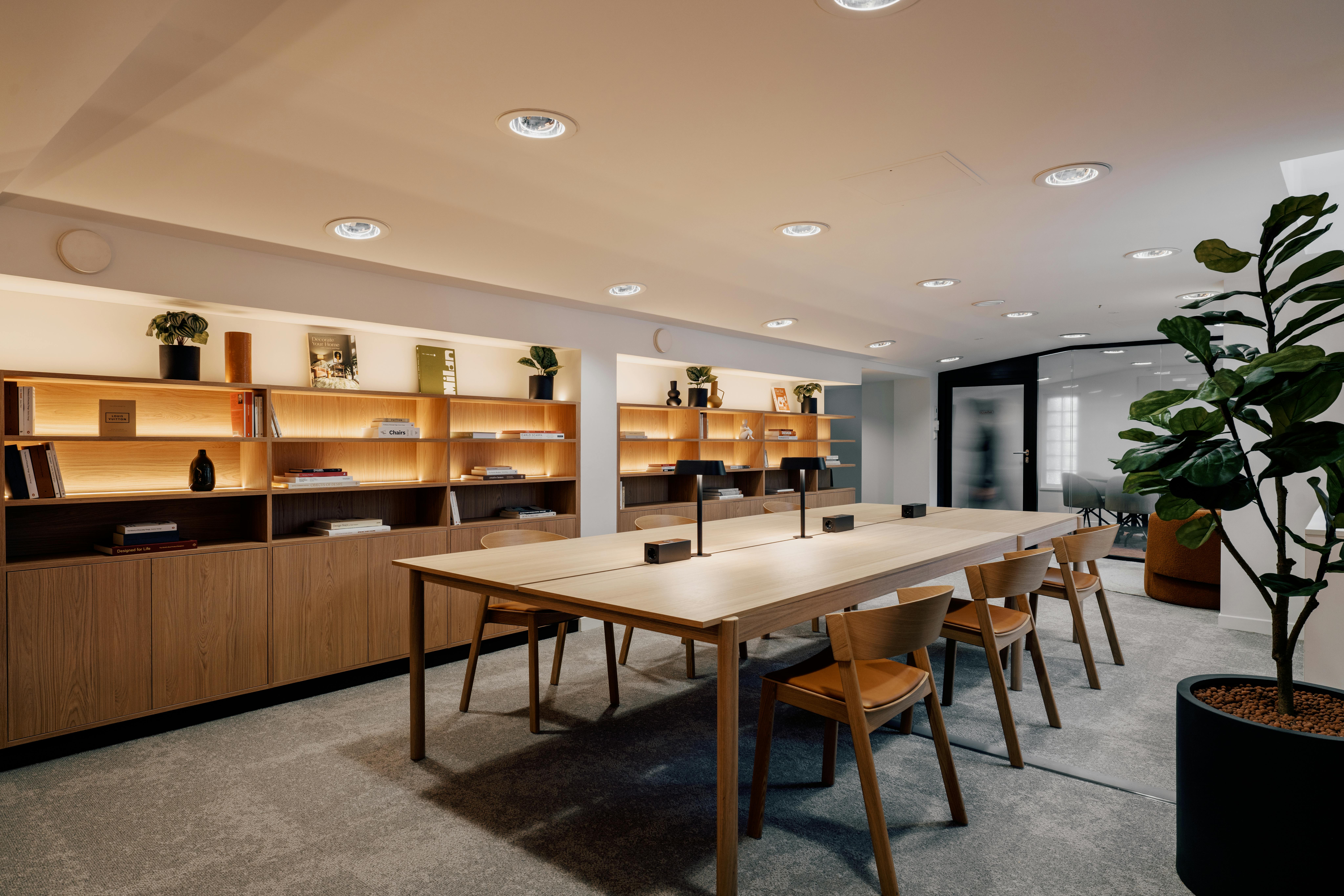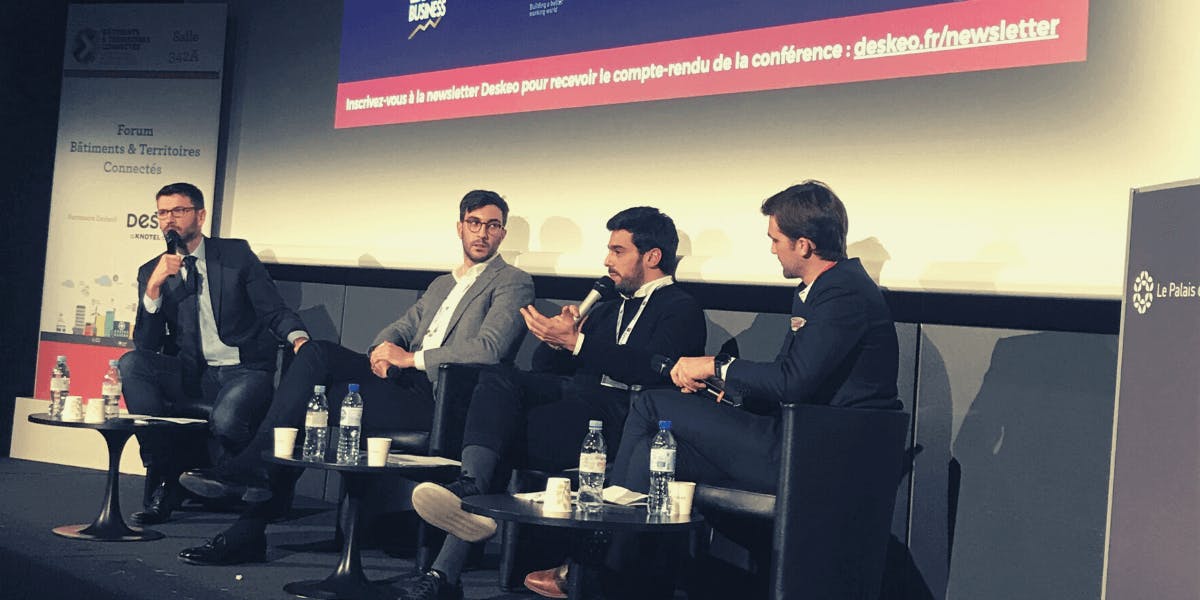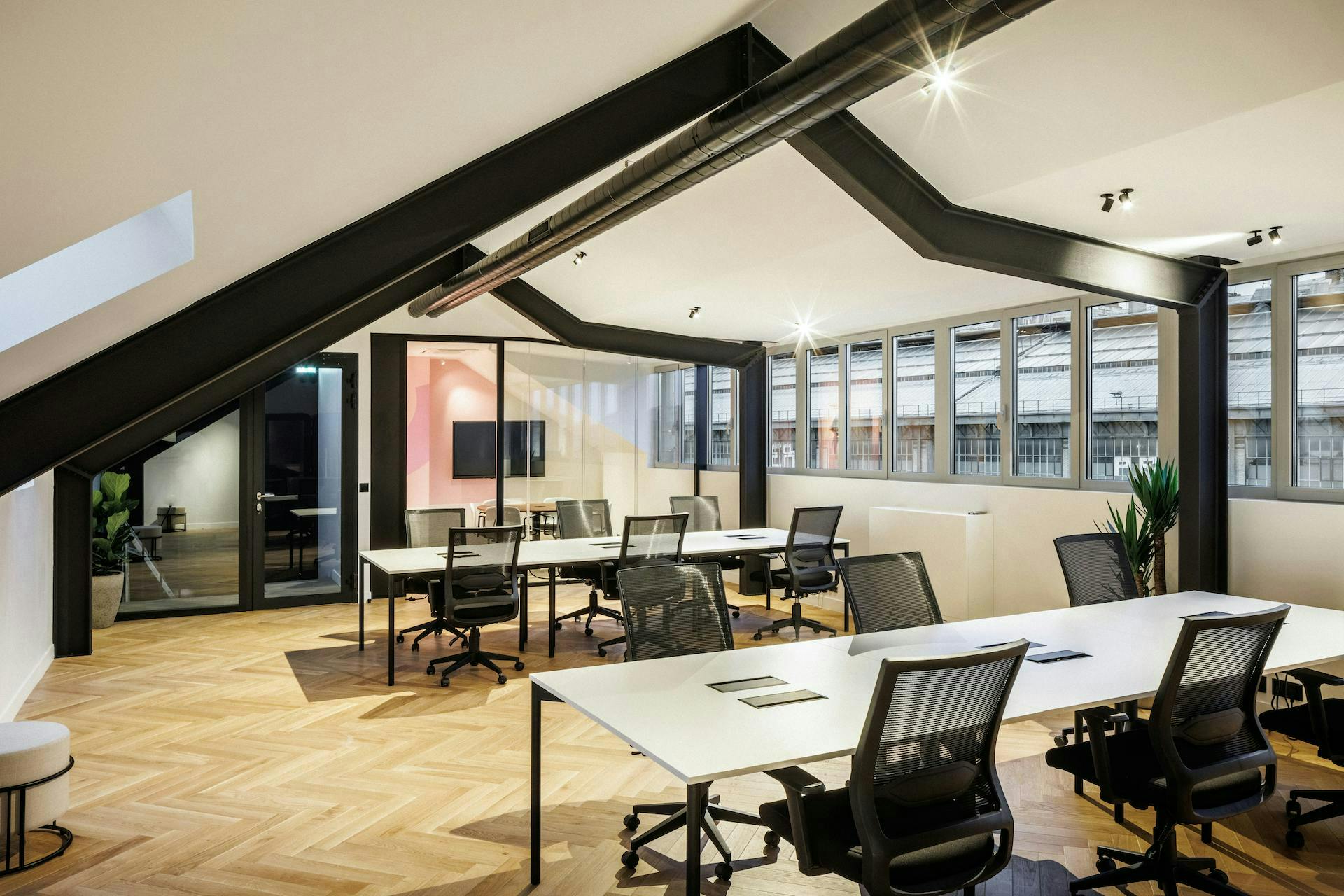

Will the 3-6-9 lease disappear?
On the occasion of the SIMI, Deskeo organised a conference on 11 December on a theme that concerns all players in the office property market: the future of the so-called "3-6-9" commercial lease. Indeed, office real estate is facing a paradox. On the one hand, landlords are looking to make their assets profitable in the long term. On the other hand, companies need workspaces adapted to their short-term needs.
How can the interests of these two players be reconciled? What alternatives to the 3-6-9 lease can make the market more fluid? These are all questions that the three speakers at this conference tried to answer: Benjamin Teboul, co-founder of Deskeo, Paul Sanouillet, Flex Office Director at JLL, and Bertrand Justamente, Real Estate Director at EY (Ernst and Young). More than 250 people took part in this discussion moderated by Guillaume Sommerer, deputy editor-in-chief at BFM Business and presenter of the Intégrale Placements programme. Here are a few highlights.
Guillaume Sommerer: When the stone moves, it is often because there is an earthquake nearby. Today, office property is in a state of upheaval with vacancy rates at historic lows in the Paris market and strong tension between landlords and tenants. The economic world is accelerating and the time horizon in business models is getting shorter. What does this mean for 3-6-9 leases?
Paul Sanouilllet: There is still a dynamic demand for 3-6-9 but there is also a new demand, where this traditional lease is no longer adapted. So there is a demand for flexibility that affects several users:
- New companies that are new to the market, or are growing strongly
- But also more established companies that may have subsidiaries in project groups.
This is a growing challenge and that is why we have created a department specialising in this subject.
G.S.: Bertrand, as a user. There is a balance of power today, between landlords and tenants. Who is winning?
Bertrand Justamente: Today, in the big cities, especially in Paris and Lyon, the landlords are in a strong position and can impose long leases. We're talking about 9 years, or even 12 years! In other regions, the market is more fluid, and the tenant can therefore be entitled to more favourable franchises and terms.
At EY, we use both possibilities. The majority of our offices are on 3-6-9 leases. There are 260,000 of us worldwide, so we know that we have a minimum number of square metres in which we will operate. To do this, we are going to use sensors and collect data to measure our real estate needs. However, we will also use the flexible spaces for medium-term projects, such as the 2024 Olympic Games or groups of projects lasting a few months.
G.S.: What about the financial question?
B.J.: Real estate is our 3rd largest cost, just after payroll and IT. This is a huge issue. In terms of cash flow, spending millions on fit-out is not something that companies are willing to do. Therefore, flexible space means that you don't have to spend on capex directly and invest elsewhere, in your employees or your technology.
G.S.: Benjamin, you were telling me that the biggest landlord in Paris has barely 1% of the market?
Benjamin Teboul: Paris and the inner suburbs represent 50 million square metres of office space. In terms of the capital needed to generate real estate acquisitions, these are considerable sums and in terms of the process, these are very long cycles. And indeed, today, the largest Parisian lessor holds about 1% of the market. However, in a very tight market, the lessors are in a strong position. There is very little vacancy, there are many candidates, so landlords tend to demand longer commitments.
G.S.: So we can imagine that companies will try to escape this 3-6-9 lease?
B.T.: Yes, if the education is done. Today, flexibility and services tend to be democratised. If property consultants can offer several options, companies have the choice according to their needs. This is the case with EY, for example. We are not intended to replace the entire 3-6-9 lease in their case, but to be a complementary solution for part of their workforce.
G.S.: What about the Paul landlords? How do they react to this new demand?
P.S.: The market is evolving fast, so this is forcing everyone to review their business model and to challenge themselves. In order to get closer to their users, some have launched more flexible initiatives. However, these offers concern their own property and their deployment scale is therefore necessarily smaller than that of Deskeo, which can lease thousands of square metres relatively quickly, in various sectors.
G.S. : Today, one word often comes up when we talk about flexibility, and that is coworking. Benjamin, can coworking alone meet this demand?
B.T.: Coworking is a word that has become commonplace, but we must not confuse it. To go back over the history quickly, in the 1980s the IWG Group created business centres, then at the end of the 2000s, we saw the emergence of co-working with the Wework phenomenon, then today flexibility operators such as Knotel and Deskeo.
We all provide flexibility but we address very different clients. Coworking is aimed more at companies with 1 to 10 employees, with needs for collaboration, networking, etc. On the other hand, from 15-20 employees, once the companies are more established, with different departments and specific needs in terms of layout and design, that's where we come in.
G.S.: How does this work in practice? Do you buy space?
B.T.: No, we lease space, which allows us to cover a very large part of the market. The real estate companies buy and develop the properties, that's their job. The brokers distribute these spaces by advising their clients. For our part, we lease these spaces to operate them. Our added value lies in our services and flexibility.
We take care of finding the right space for a company, then we design the space with our in-house team of architects specialising in workplace strategy. We manage the construction sites and deliver the turnkey space created specifically for the client, with a flexible commitment period. Thereafter, we take care of the day-to-day management of the offices with our dedicated team of space operations managers.
G.S.: But what is the difference between a co-working operator and a Deskeo?
B.J.: The big difference for us is that we often use flexible spaces but we want the clients to be in our offices. In most coworking spaces, there is a brand image of the operator.
B.T.: To use a term from the technology industry, today we are a marketplace. We aggregate the space of the various partner real estate companies, which allows us to have a varied offer in terms of size and location to propose to our clients.
P.S.: Our role is to provide the best possible advice to our clients; today, Deskeo allows us to offer different things. We can create a product that doesn't exist together or do a traditional lease and a flexible lease. We're not going backwards, there's a new way of consuming square metres.
G.S.: So is the 3-6-9 lease doomed to disappear?
B.J.: No, absolutely not. Players such as Deskeo are going to commit to 3-6-9 leases. The only difference is that for users, the 3-6-9 lease will no longer represent 100% of the market but will coexist with flexibility offers.
Question from the audience: Flexibility is good, but doesn't it cost more?
B.T.: Between the rental value proposed to a user in a 3-6-9 lease and the rental value that is actually paid, there is a coefficient of 2. What we must not forget is :
- The charges and taxation section
- The depreciation of fixtures and fittings
- The OPEX part (management, maintenance, cleaning, internet, staff costs to run the offices)
- The return clause where you will have to restore the offices and therefore face the costs of the works and a double rent to install your team elsewhere for the time necessary.
In effect, the company pays double the rent. At Deskeo, we have a coefficient of 1.8 to 1.9. We are therefore 15% cheaper than a traditional lease.
I'm not even talking about the case of a company that has signed a 6-year lease and finds itself having to move after 4 years. And I'm not even mentioning the CAPEX savings that Deskeo represents, which allows you to invest your money in your development rather than tying it up. Economically, it is more profitable and, above all, in a practical way, it is much more pleasant than having to manage everything alone when you are not an expert.

Contact Us
We find your Perfect fit!
